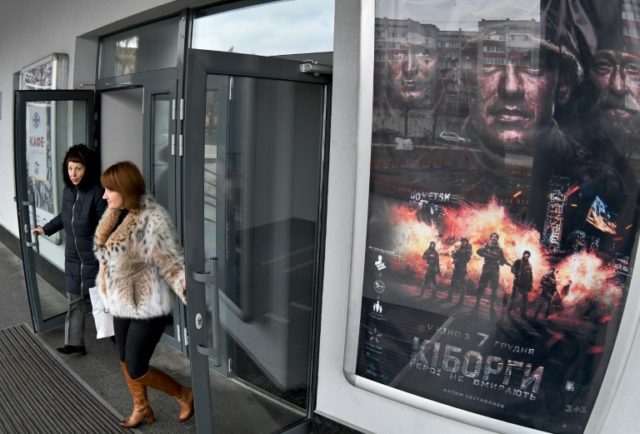Kiev (AFP) – A new Ukrainian feature film called “Cyborgs” has become the first to depict the bloody war against Russian-backed separatists, focusing on a battle for a highly symbolic airport.
The patriotic drama details the clash for Donetsk airport, a gleaming international hub rebuilt as the eastern industrial city prepared to host the Euro 2012 football championship.
After the ongoing conflict broke out in 2014, rebels seized control of Donetsk and for more than eight months besieged government forces defending the airport in fierce fighting that reduced the terminals to a charred steel skeleton.
The Cyborgs title refers to a nickname for soldiers holed up in the airport who withstood tank attacks and shelling despite limited logistical support from Kiev.
“Wow, how cool you are! You can’t be human, you’re probably cyborgs!”, a unit commander exclaims at the start of the film as his men opt to stay inside the ruined airport despite facing deadly danger.
The 45-year-old director Akhtem Seitablayev told AFP the movie was about “the armed men who protect our country and thanks to whom I am able to get up every morning, kiss my kids and indeed, make movies.”
Since a December release, it has earned 22.2 million hryvnias ($800,000, 640,000 euros) at the box office, becoming Ukraine’s top-grossing film made with state funding.
Some screenings have taken place in Kiev-held towns in the conflict zone in the east of the country, but it has not been released in Russia.
The film has yet to recoup the total budget of 42 million hryvnias — half of which is state funding that does not need to be reimbursed.
Scenes show volunteers — including school teachers, students, engineers and even actors — fighting alongside professional military and struggling with a lack of water, food and ammunition.
The 242-day siege of Donetsk airport has been compared by Ukrainian media to the long drawn-out siege of Stalingrad during World War II.
The airport finally fell to the rebels with 200 Ukrainian soldiers dead and separatist losses estimated at up to 800.
– Fighters as consultants –
Real-life Ukrainian fighters provided the inspiration for some characters and acted as consultants during filming.
One of the leading roles, a unit commander with the nom de guerre Serpen, or August in Ukrainian, is partly based on Andriy Sharaskin, an actor who went to the frontline as a volunteer.
In one scene, Serpen and others make emotional phone calls to their loved ones as they await a major attack.
“We really did say our goodbyes then. We called our relatives to hear them for the last time,” Sharaskin said, recalling a phone conversation with his daughter.
Amid such human tragedy, “Cyborgs” includes comic episodes as the soldiers tell jokes against the backdrop of bloody battles.
“Did you call a taxi to the airport?” an officer asks troops as they wait for an armed personnel carrier to take them to the terminal — with slim chance of a return journey.
The director said he was moved to make the film after hearing of many well-educated and successful people who risked their lives to fight as volunteers.
“Their optimism and their clear understanding of why they went there can contribute to the birth of a new Ukrainian political nation,” said the director.
– ‘Not a civil war’ –
At the end of a packed viewing in Kiev, some spectators could not hold back tears.
“Unexpectedly, I liked the film. We are used to the fact that war films are propagandistic, but this one is actually realistic,” viewer Kateryna Esmanova told AFP.
Following overwhelming evidence of Moscow funnelling in troops and arms, the film stresses this is a war with Ukraine’s former Soviet master Russia, rather than pro-Russian insurgents.
Packed with dialogue about the meaning of patriotism, “Cyborgs” appears to be aimed at Ukrainian audiences, but producer Ivanna Diadiura told AFP they wanted to show it at international film festivals too.
The director said he believed the message would resonate with all audiences.
“It seems to me that we managed to structure the drama in such a way that anyone — even someone who knows nothing about these events — will see this is not a civil war,” Seitablayev said.
“Our characters speak both Ukrainian and Russian and this is a war about a civilisational choice between a Soviet past and, I hope, a European future.”
The fighting in Ukraine has cost more than 10,000 lives since April 2014.

COMMENTS
Please let us know if you're having issues with commenting.